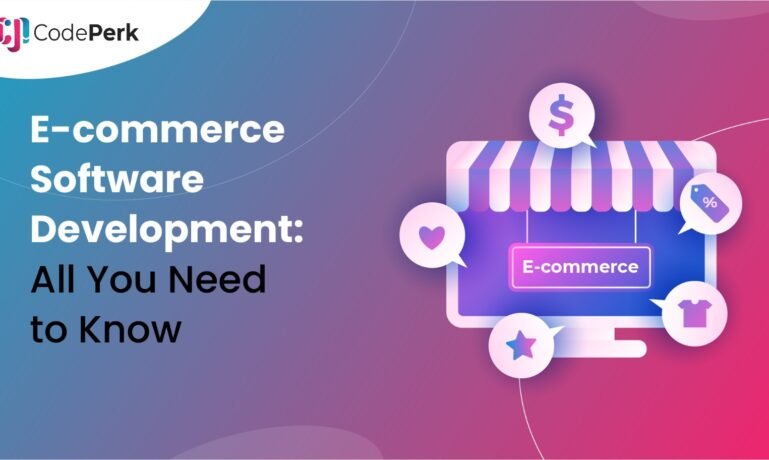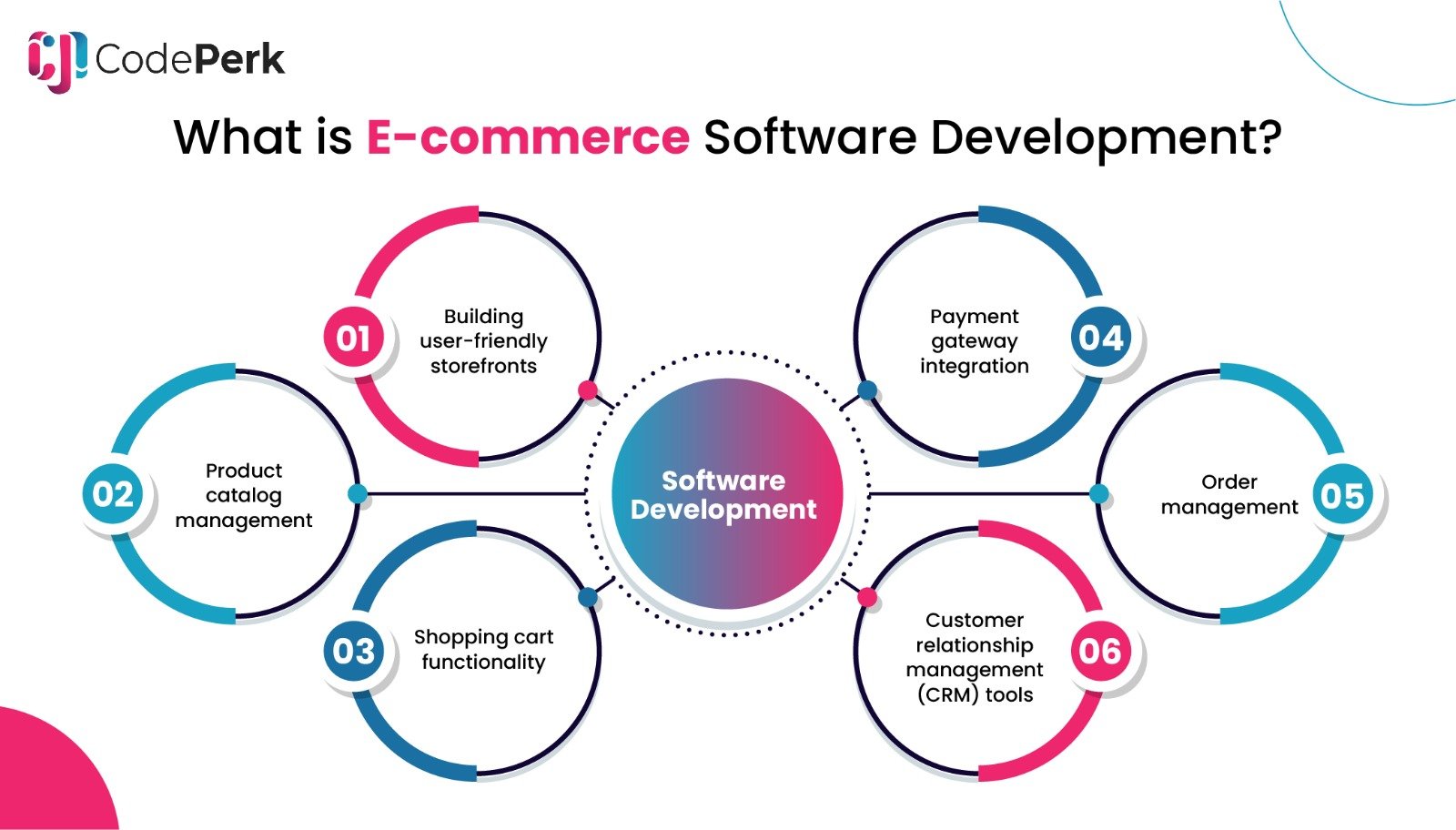
E-commerce Software Development: All You Need to Know
The e-commerce landscape is booming! You’ll need a robust online presence if you’re a business owner looking to tap into this ever-growing market. This is where e-commerce software development comes in.
In this comprehensive guide, we’ll delve into everything you need to know about e-commerce software development, from understanding its core concepts to exploring the different types of e-commerce platforms and the development process itself.
What is E-commerce Software Development?

E-commerce software development refers to creating and maintaining software applications specifically designed for online stores. This encompasses a wide range of functionalities, including:
- Building user-friendly storefronts: This involves designing and developing the website or mobile app that serves as your online store. It ensures a seamless browsing and buying experience for your customers.
- Product catalog management: E-commerce software allows you to add, edit, and manage your product listings efficiently. This includes adding product descriptions, images, prices, and inventory management tools.
- Shopping cart functionality: A robust system is crucial for customers to select and purchase products. E-commerce software development ensures a smooth flow from adding items to the cart to completing the checkout process.
- Payment gateway integration: Secure payment processing is essential for any online store. E-commerce software development integrates with payment gateways like PayPal or Stripe to enable secure transactions.
- Order management: Efficient order management is key to running a successful online business. E-commerce software helps track orders, manage fulfillment, and communicate with customers about their purchases.
- Customer relationship management (CRM) tools: E-commerce software can integrate with CRM tools to help you manage customer data, personalize marketing efforts, and provide excellent customer service.
Benefits of E-commerce Software Development

Investing in e-commerce software development offers a multitude of benefits for your business, including:
- Increased Sales and Revenue: A well-designed e-commerce platform allows you to reach a wider audience and sell your products 24/7, ultimately boosting sales and revenue.
- Reduced Costs: While there’s an initial investment, e-commerce software development can be more cost-effective in the long run compared to maintaining a brick-and-mortar store.
- Improved Customer Experience: A user-friendly e-commerce platform with intuitive navigation and a smooth checkout process enhances customer experience, leading to higher satisfaction and repeat business.
- Enhanced Scalability: E-commerce software can be easily scaled to accommodate your growing business needs. You can add new features, functionalities, and product lines without significant infrastructure changes.
- Data-Driven Insights: E-commerce platforms provide valuable data about customer behavior, purchasing trends, and product performance. This data can be used to optimize your marketing strategies and make informed business decisions.
Types of E-commerce Platforms

There are several e-commerce platforms available in the market, each catering to different needs and budgets. Here’s a breakdown of the main types:
- Open-Source Platforms: Popular options like Magento and WooCommerce offer a high degree of customization but require technical expertise for setup and maintenance.
- SaaS (Software-as-a-Service) Platforms: SaaS platforms like Shopify and BigCommerce are user-friendly and require minimal technical knowledge. They offer subscription-based pricing with built-in features and functionalities.
- Headless Commerce Platforms: Headless platforms separate the front-end (customer experience) from the back-end (e-commerce functionalities). This allows for greater flexibility and customization but requires more development expertise.
Why Need E-commerce Website Development Services
E-commerce website development services encompass the entire process of creating a custom online store tailored to your specific needs. This includes:
- Planning and Strategy: Collaborating with developers to define your business goals, target audience, and desired functionalities for the website.
- User Interface (UI) and User Experience (UX) Design: Creating a visually appealing and user-friendly website that is easy to navigate and facilitates a smooth buying experience.
- Front-End Development: Building the website’s user interface using programming languages like HTML, CSS, and JavaScript.
- Back-End Development: Developing the server-side functionality of the website that manages product data, orders, payments, and other core operations.
- Content Management System (CMS) Integration: Integrating a CMS allows for easy content management, enabling you to update product information, blog posts, and other website content without technical expertise.
- Security Features: Implementing robust security measures to protect customer data and financial information.
Which are E-commerce App Development Platforms?
In today’s mobile-first world, e-commerce app development allows customers to browse and purchase products from the convenience of their smartphones. E-commerce app development services typically involve:
- Native App Development: Creating separate apps for iOS and Android platforms to leverage device-specific features and optimize user experience.
- Hybrid App Development: Developing a single app using frameworks like React Native that can run on both iOS and Android devices. This offers a faster and more cost-effective approach.
- App Design: Designing a user-friendly and intuitive app interface with a focus on quick browsing, search functionality, and a seamless checkout process.
- Push Notifications: Integrating push notifications to keep customers informed about promotions, new arrivals, and order updates.
- Mobile Payment Integration: Enabling secure mobile payments through popular options like Apple Pay or Google Pay for a convenient checkout experience.
The E-commerce Software Development Process
The e-commerce software development process typically follows these key stages:
- Discovery and Planning: This initial phase involves defining your business goals, target audience, and desired functionalities for your e-commerce platform.
- Design and Development: The development team translates your vision into a user-friendly and functional e-commerce platform. This involves UI/UX design, front-end and back-end development, and CMS integration.
- Testing and Quality Assurance (QA): Rigorous testing ensures your e-commerce platform is bug-free, secure, and functions flawlessly across different devices and browsers.
- Deployment and Launch: Once testing is complete, your e-commerce platform is deployed and launched to the public.
- Ongoing Maintenance and Support: Regular maintenance and updates are crucial to ensure security, address any bugs, and integrate new features as your business evolves.
See Also: How Web Development Company Can Help You Kickstart Your Business
Choosing the Right E-commerce Software Development Partner
Selecting the right e-commerce software development partner is vital for the success of your online store. Here are some key factors to consider:
- Experience and Expertise: Look for a development company with a proven track record in creating successful e-commerce platforms.
- Understanding of Your Industry: Choose a partner who understands your specific industry and its e-commerce challenges.
- Scalability: Ensure the chosen platform can scale alongside your growing business needs.
- Budget and Pricing: Define your budget beforehand and get transparent pricing quotes from potential partners.
- Communication and Customer Support: Choose a partner who prioritizes clear communication and offers reliable customer support throughout the development process.
Conclusion
E-commerce software development empowers businesses of all sizes to establish a robust online presence and tap into the ever-expanding online market. By understanding the core concepts, exploring different platform options, and choosing the right development partner, you can create a successful e-commerce platform that fuels your business growth.
